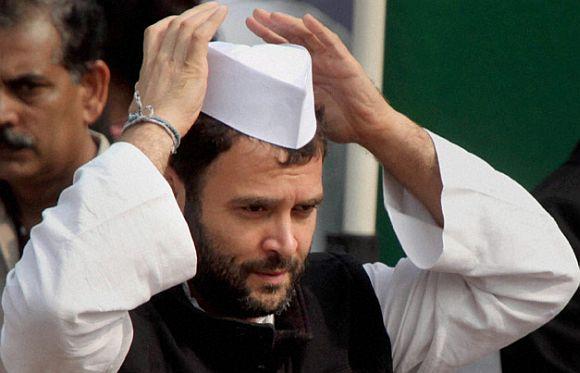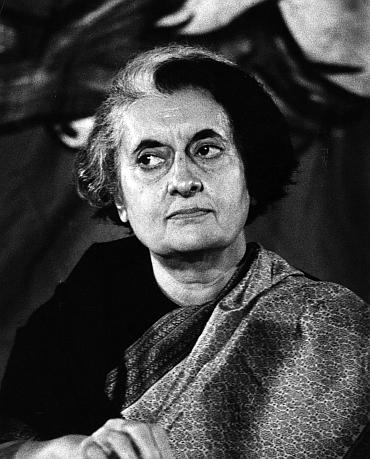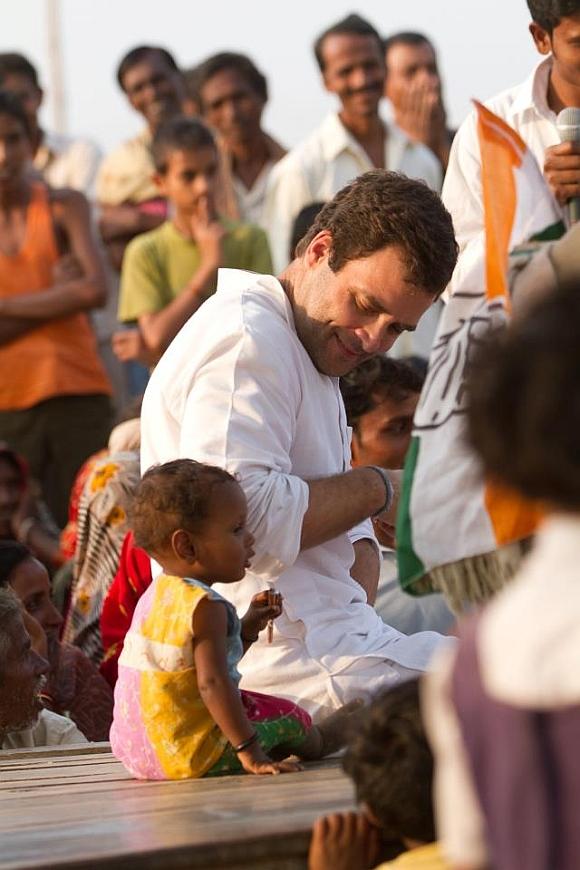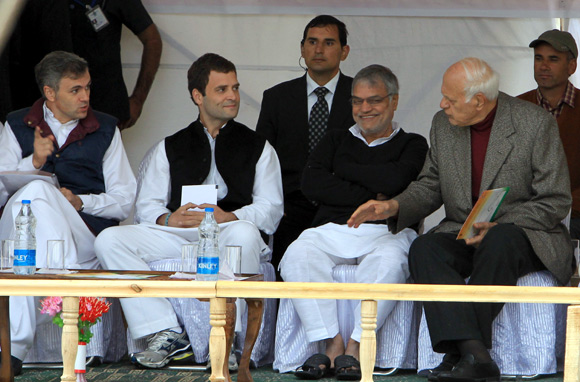 | « Back to article | Print this article |
What will the Congress look like under Rahul?
Rahul Gandhi is very, very different from all the Gandhis before him, says Aditi Phadnis
Barely 10 days ahead of the Congress Chintan Shivir in Jaipur, a journalist asked a junior minister who is part of the so-called youth brigade headed by Rahul Gandhi if he was going to Jaipur. "Me? Naah," he replied. He explained that it was likely to be a seniors-only affair and added that none of his other colleagues was going; only ministers of state with independent charge and above had been invited.
Top leaders of the Congress confirmed that it would be a routine contemplate-your-navel meeting. "Koi taajposhi nahin hogi(There will be no coronation)," replied senior leader Janardan Dwivedi hotly when it was suggested to him that Rahul may be elevated at the Chintan Shivir. Congress general secretary Digvijaya Singh endorsed this. Several leaders said tiredly that it would be the usual -- a non-event masquerading as a turnaround story for the party.
And yet, three days later, all Youth Congress and National Students' Union of India leaders had started packing their bags, stopped shaving (a stubble is de rigueur in RG circles) and had booked taxis to Jaipur. At Jaipur, briefing reporters, the same Dwivedi said, somewhat inexplicably, that Defence Minister A K Antony had khade hokar (standing on his feet) proposed that Rahul be made vice-president of the party (why it was necessary to stand up and make this announcement is a mystery).
Observers noted two things: one, Ahmad Patel, political advisor to Congress President Sonia Gandhi, was not seen on the dais during the entirety of the Shivir; and two, Priyanka Gandhi Vadra, although in Jaipur, was lurking in the background. At the end of the day, for all the claims of democratising the party, the Congress was divided into two sets of people: those who had only suspected Rahul would be elevated at Jaipur (most of the party including top leaders) and those who knew (Sonia, Rahul and Priyanka).
Like all other major events, this too was devised, plotted and rolled out with just the immediate family as the main actors.
Click NEXT to read further...
How will his leadership differ from that of other Gandhis?
Now that the event has happened at last, what will the Congress under Rahul, 42, look like? How will his leadership differ from that of his predecessors, the older Gandhis? Rahul is quite, quite, different from all the Gandhis before him.
In 2009, for example, during the campaign for the Chhattisgarh assembly elections, Rahul visited a remote village in the interiors of the state where the only Congress leader the women in the village acknowledged was Indira Amma. Gandhi sat on his haunches to talk to one of them. Her complaint was: we get no water in the tubewell, so we need a new borewell.
Former Prime Minister and Rahul's grandmother Indira Gandhi would have asked the district authorities to act. Her son and also former Prime Minister and Rahul's father Rajiv Gandhi would have turned around and said, "Mani (Manishankar Aiyar), see to it". Sonia might have noted it down and called a Congress functionary to set the problem right. But Rahul's response was sui generis.
He said: "Pehle dekhna hoga yahan paani hai bhi ya nahin, water table kitna gehra hai (We will first have to see if there is water here at all, how much has the water table fallen)." "Election time and he wants to check the water table," muttered a reporter under his breath. Rahul detests the politics of grand gestures, the lies and rhetoric, the fancy flourishes and summoning up of dreams. It would have been so easy just to fix the problem without meaning to fix it permanently.
This is an approach that is exasperating for those who have invested their future in the Congress mainly to win elections and don't necessarily want to address or correct original sins. This kind of politics also sits ill with most voters who are happy to lap up lies, as long as it sounds good.
Last month, when young people who were leading the agitation against the gang-rape of a young woman in Delhi met him, Rahul refused to say what they wanted to hear: that the guilty would be hanged, that there must be stricter laws and that these would be promulgated immediately. All he said was, "Laws cannot be changed overnight." In theory, of course, he was right -- they can't. But this was translated to mean he didn't want to reach out to the protestors.
Similarly, Rahul's answer to Anna Hazare's campaign against corruption was to forcefully seek statutory status for the Lok Pal, rather than approach Hazare with humility, concede him a place of leadership and request him to break his fast with a glass of water. People in Amethi claim that Rahul's constituency office in Delhi has a sign which says: No Naukri, No Transfers.
While campaigning for the Assam polls in April 2011, he met a group of youngsters who complained of discrimination against Northeasterners in jobs in Delhi. "I don't think so," replied Rahul. "I see a lot of people from the Northeast in the hospitality business." The youngsters would have been much happier to hear him say they were right and it was all so unfair.
For the party organisation, fed and fattened on slogans, this is hard to understand. When he encouraged PowerPoint presentations from laptops at internal meetings of the Congress, many laughed behind his back and said: "This high-end laptop culture of drawing-room politics will not help the party. Real politics is not about computer files, but caste equations in India." But that's exactly what he wants to overcome. "When I know what Rahulji wants to do, I will tell you," was the sarcastic reply of a senior Congress minister when asked by a reporter if he knew the blueprint for the Congress in Rahul's head.
Click NEXT to read further...
Rahul is approaching politics like an MBA
But this much is clear: Rahul is approaching politics like an MBA. He truly, passionately believes that if permanent but flexible systems are in place, there can be no option but victory. So Uttar Pradesh which got a new Congress Chief -- Nirmal Khatri -- after its drubbing in assembly elections has been divided into eight zones. Ministers, along with designated party leaders, are in charge of one zone each.
They are responsible for winning it, they have to suggest nominees for local elections and build the party bottom upwards. Work is on apace to demarcate the entire country into 54 zones, entrusted to a group of people who will handle each zone -- a small handpicked committee in the Congress has been working on this project since October 2011.
Rahul started with the restructuring of the NSUI and the Youth Congress, and reckons what has worked there must work for the rest of the party as well. The NSUI and Youth Congress executive used to meet once every 15 days to discuss restructuring and immediate political challenges. Sooner than later, this will be the case with the Congress party as well.
Some evidence of this was seen in the 2009 general elections when the services of professionals like Bindeshwar Pathak of the Sulabh public utility movement, environmentalist R K Pachauri, Minority Commission representatives, leading lawyer K T S Tulsi and some non-governmental organisations were requisitioned to help formulate the manifesto.
Amethi too now has a unique system to seek its development demands: Printed forms are given to villagers to give personal details and tick-mark their exact demand from the long category and sub-category of works. If Rahul meets someone impromptu (which he does quite often), closest aide Kanishka Singh is on hand to take notes. And because this is India in 2013, the final question always is: "What is your mobile number?"
Rahul toured Karnataka just two months before the last assembly polls which were crucial for his party. But, after a breakfast of honey and bread shared with a tribal in his hut, he spent an entire day among hundreds of tribesmen without a single word about the forthcoming elections.
Young people asked him questions like: "We want education that can give us jobs, how do we learn English, and how can we get scholarships for studying at IIT and IIMs?" Rahul said: "I agree that education is fundamental. We need to have more schools and colleges."
Click NEXT to read further...
Rahul has no storm troopers
To be sure, there is a sense of entitlement in Rahul which showed clearly in his speech at Jaipur where he, more or less, said the sacrifices made by his family entitled him to lay dynastic claim to the leadership of the Congress. But the acrid taste of defeat in the Uttar Pradesh assembly elections lingers. His visits to Amethi, his constituency, after the Congress's debacle last year number below five.
He was in Amethi in September 2012, the day the government announced a steep increase in the price of diesel. His constituents surrounded his guest houses and raised slogans against the Congress. While inaugurating a branch of a bank in Bhadar, Uttar Pradesh, he found crowds jeering at him. "Forget ATMs, and give us roads and jobs," said a protestor.
Rahul's inability to respond to challenges on the floor of Parliament has also left the Congress somewhat disappointed. He has barely spoken in the Lok Sabha -- Parliamentary Research Service says he has only spoken in one parliamentary debate in UPA II.
The average number of times member of Parliament from across India have participated in debates in the same time frame is 30.1.
Rahul has never raised a question during this time, compared with a national average of 235 questions per lawmaker, and he has only attended 41 per cent of sessions, compared with the average of 77 per cent. Nor does he seem particularly eager to tangle with the Bharatiya Janata Party on the floor of the House; it took Sonia's feisty intervention in the Monsoon session last year to force Lal Krishna Advani to retract his words that UPA II was "illegitimate". Rahul just sat back and listened.
Rahul is no Sanjay -- he has no storm troopers, only political executives. He is no Rajiv either, placid and appreciative of adulation. He is stubborn, opinionated and ambitious. Sooner or later, his patience with forcing the Congress into becoming a democratic party will flag. Hard to say what will happen when that happens.
TOP photo features of the week
Click on MORE to see another set of PHOTO features...




